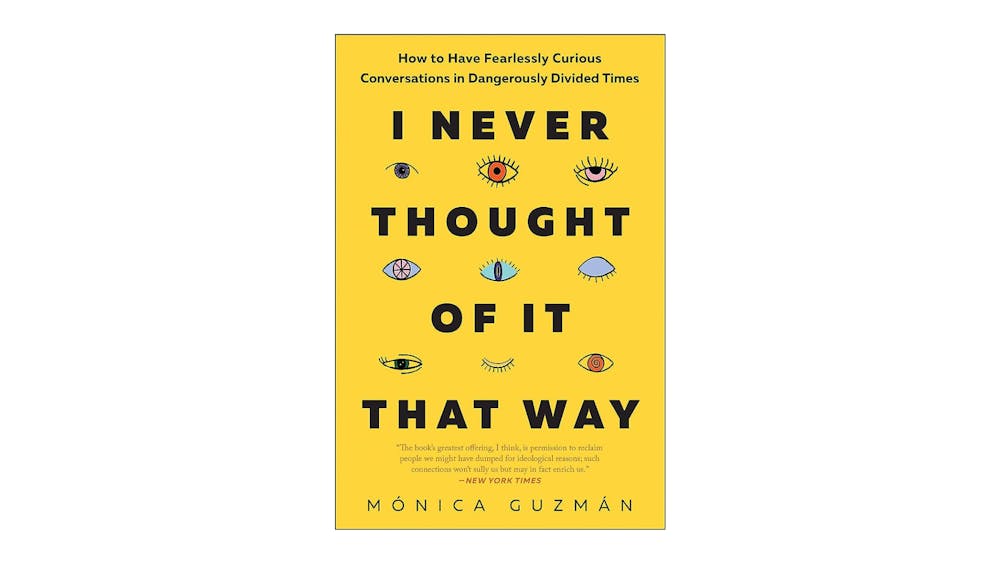Every year, a committee of 17 faculty, staff and students meet over a span of 15 to 18 months to choose the common reading book for incoming freshmen to read over the summer, according to Paula Patch, English professor and chair of the common reading committee.
For the 31st year of common reading, the committee chose “I Never Thought of It That Way: How to Have Fearlessly Curious Conversations in Dangerously Divided Times” by Mónica Guzmán. Patch said the goal of this book is to start conversations.
“Small talk was really hard to do coming out of a pandemic, so I think one of the things that's really cool is her book is about having these conversations,” Patch said. “How do you talk to people, and then what should you be thinking about yourself? What are you bringing to the conversation and how should you be thinking about other people and sort of the dynamic of conversation.”
Freshman Amelia Brinson said this aspect of the book helped her feel prepared to leave her comfort zone. The start of the academic year welcomes about 1,700 freshmen and transfer students to Elon’s campus.
“That's a big part of the book, is having conversations with people with different viewpoints or different opinions,” Brinson said. “And as a person who enjoys talking to other people, I think it also gives me some strategies that I can employ when I'm having more professional discussions.”
Brinson read the book early in the summer and said she first approached the book as an assignment. As she read, she realized it felt less and less like schoolwork.
“It's not the type of book I would generally go to a bookstore and pick out,” Brinson said. “But this book actually did a really good job of keeping me interested, and it was a really fun read.”
Patch said the worst thing students can do is treat the common reading as a textbook.
“Often, faculty and staff will look at it, be like, ‘Oh, this is a book I'm going to use in my classroom, and that makes it a textbook.’ But that is not how students are approaching this book in the summer, and I don't think they should,” Patch said. “In that moment, it hasn't yet become a course textbook.”
Once the academic year has started, professors may assign the book in their classes, according to Patch. Patch said at that point students may reread the book — but she often hears students approach rereading the wrong way.
After listening to students complain for years about having to read books they had already read again for classes, she asked them if they were reading the books over again from cover to cover. To her surprise, she said, many of them were.
“That's not what we're asking you to do,” Patch said. “You're at an advantage if you've already read this book. So when they get to class and then they're asked to do whatever, they're rereading, they're going back to the little sticky note they added or the dog eared page.”
For the first time, the university provided an online version of the book to all incoming freshmen this summer, available through Moodle. Patch said, in the past, students have said they didn’t read the book before classes started because they didn’t want to buy it. But even though students can access the book for free this year, they might still not have read it.
“Noticing that two-thirds of our first-year students had not accessed the Common Reading Moodle site, I sent them a very nice nudge: "Hey, have you started the Common Reading?" All 1,750+ of them. Via my work email. And now they are emailing me back. I have a new full-time job,” Patch posted on the X platform, formerly known as Twitter.
Brinson participated in Elon’s “Adventures in Leadership” program this summer with other incoming freshmen and said when she spoke with other students who hadn’t yet started the book, she told them not to treat it as schoolwork.
“I was saying that ‘You might think at first glance that it might be like one of those old nonfiction books written by a professor or something, but it was actually really interesting,’” Brinson said.“I made sure to tell people that it was actually kind of fun and engaging to read.”
Though she wasn’t initially sure about it, Brinson said she enjoyed the book so much, she’s been recommending it.
“I told my whole family that they should definitely read it,” Brinson said. “That made me want to go have in depth conversations with people about their lives and their history and such.”


